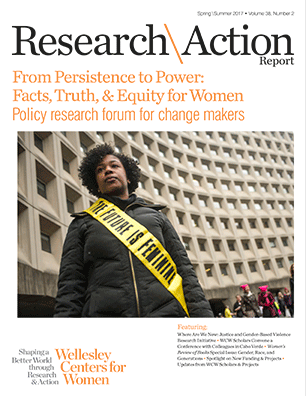A Special Women’s Review of Books Feature
Last year, Amy Hoffman, M.F.A., editor-in-chief, Women’s Review of Books (WRB) began thinking about the organizing by Black Lives Matter against police violence and other forms of racist oppression, the intersectional politics of this new movement, and its similarities and differences—in politics and strategies—from previous organizing. She decided to bring together (virtually, through email) a few older and younger Black women activists to talk about their experiences and ideas. A special roundtable discussion with Demita Frazier, J.D., Stacey Patton, Ph.D., Barbara Smith, and Mecca Jamilah Sullivan was featured in the March/April 2017 issue of WRB.Frazier is a lifelong political activist, beginning at age 14, when she became an avid anti-Vietnam War protester after learning the impact of the war on Black people and other people of color. She was a founding member of the Combahee River Collective, a radical Black feminist organization that convened from 1975–1981. She has remained, through several decades of community organizing in coalition with other radical and progressive groups, an unrepentant Black feminist. She teaches in the Bridges Program at Bunker Hill Community College in Boston, MA, and has taught and lectured at colleges and universities around New England.
Patton is an award-winning journalist, historian, and child advocate. She is the author of the memoir, That Mean Old Yesterday (2008) and the study, Spare the Kids: Why Whupping Children Won’t Save Black America (2017).
Smith is a Black feminist author and activist who has played a groundbreaking role in opening up a national cultural and political dialogue about the intersections of race, class, sexuality, and gender. She has been politically active in many movements for social justice since the 1960s.
Sullivan is assistant professor of Women, Gender, Sexuality Studies at the University of Massachusetts, Amherst, where she is completing a manuscript, The Poetics of Difference: Queer Feminist Forms in the African Diaspora, which explores gender, sexuality, and poetic form in global Black women’s literary cultures. She is the author of the short story collection, Blue Talk and Love (2015). Her fiction and essays have been published widely.
The activists answered these questions posed by Hoffman:
How do you define yourself politically—feminist, Black feminist, womanist, radical feminist, none of the above, all of the above?
What’s your experience of working and interacting across generations? What do you wish the younger generation would learn from the older generation? What do you wish the older generation would learn from the younger one? What issues are most important to you right now? Can you share an example of a success in making change around one of these issues?
Who or what are your influences and inspirations? How do you keep going?


